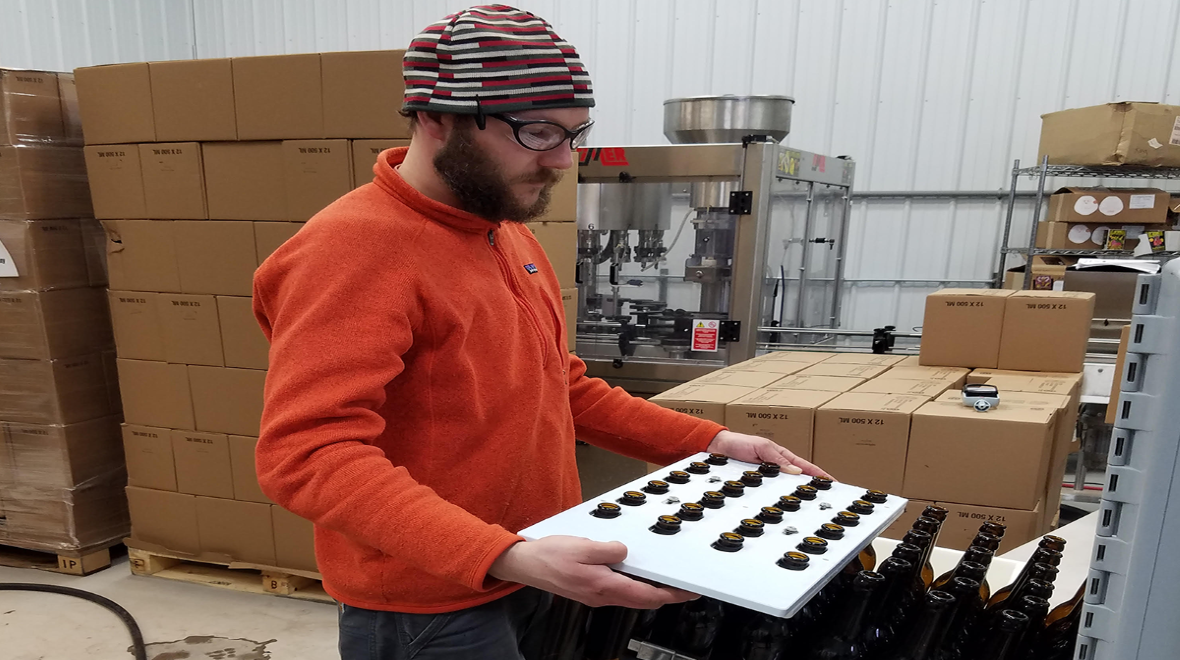What do you think when you hear the word “apprenticeship?” A young blacksmith swinging a hammer? A novice electrician working inside a junction box? A wizened baker guiding a trainee’s hand beside a clay oven?
How about this: A small team of winemakers at a Northwest Michigan vineyard closely monitoring industrial-sized, stainless-steel barrels where world-class wine is slowly fermenting?
Thanks to a high demand for Michigan-made wine, beer and mead regionally and nationally, winemakers and brewers in the state have begun increasing their production levels. In doing so, they’ve begun incorporating manufacturing processes and principles to an industry that was once seen as more agricultural.
And with an estimated 545,000 jobs coming open through 2026, mostly in the fields of information technology, computer science, manufacturing, healthcare, automotive and additional Professional Trades, employers across multiple industries – including winemaking – are turning to apprenticeships as a way to fast track a new generation of workers into high-demand, high-wage careers.
Following through on a dream
“The world of apprenticeships is rapidly expanding,” said Tom Smith, associate director of the Institute of Agriculture Technology at Michigan State University. “And Michigan is taking national leadership in apprenticeships in the wine and grape industry. We’re very proud of St. Ambrose – and other winemakers in northern Michigan – for leading that charge.”
Smith is one of the coordinators for the Viticulture Enology Science and Technology Alliance (VESTA), a national grape and wine education program. Through a grant from Northwest Michigan Works!, VESTA was tapped as part of an innovative new Michigan winemaking apprenticeship at St. Ambrose Cellars, a winery in Beulah, near Traverse City.
Registered apprenticeships are offered through the U.S. Department of Labor and are a proven training method for employers to build a talent pipeline of highly skilled, educated employees.
Last year, Nathan Ely become one of the first graduates of the apprenticeship program.
“My dad was a home brewer, so this field has always appealed to me,” Ely said. “I’d been to college but never finished. So when the opportunity came up to establish this apprenticeship, I realized it would be a good way to both further my education and follow through on a long-held dream.”
From general laborer to head brewer
Ely, now 36, started in 2015 as a general laborer at St. Ambrose, cleaning tanks, setting up hoses and labeling bottles. In 2016, he worked with St. Ambrose President and CEO Kirk Jones to develop the apprenticeship to expand his skills.
“There’s a shortage of winemakers around here,” said Jones, who also owns/operates Sleeping Bear Farms, an apiary that produces “hive-to-table” raw honey products. “We needed to bring somebody in that we could custom train. Now we’ve got a deeper bench, which means a lot. Having one winemaker is great, but we have so much production.”
Ely spent two years in work-based learning including a combination of online classes, practical on-site lessons – which included refining his wine-tasting skills – and touring other vineyards in Northwest Michigan.
Thanks to the apprenticeship, Ely is now head brewer, overseeing the year-round production of St. Ambrose’s beer, cider and mead. The facilities are located in a 1,600-square-foot pole barn with 20-foot ceilings, which houses the massive fermentation and carbonation tanks. The on-site tasting room, which has six beers on tap at any time as well as samples of all the wine and mead produced there, has seen its sales roughly double every year since 2015.
Build your own workforce
According to a 2018 statewide survey commissioned by the Talent and Economic Development Department of Michigan (Ted), at least half of Michigan’s high school students, young adults and parents lack knowledge about the value and benefits apprenticeships offer, with only 13% of high school students considering apprenticeships a good career path option.
But now more than ever, a wide range of Michigan employers are on the lookout for eager-to-learn apprentices.
“Apprenticeships are employer driven and can be customized to the specific needs of each business whether it’s for winemaking or roofing,” said Evelyn Szpliet, Manager of Apprenticeships and Business Resource Networks at Northwest Michigan Works! “This flexibility allows employers to build their own workforce and pass along the history and skills of their occupations to a new generation of workers.”
Icing on the cake
“My apprenticeship really opened my eyes to how much there is to learn. I can definitely see myself doing this for the long haul,” Ely said.
Ely has two children, and he used the raise from his promotion to buy a house. He’s busy remodeling it, when it’s not a bottling day, of course – those are 10-hour workdays.
“I’d worked in restaurants, I’d been to college, but I never really found what I wanted to do,” Ely said. “This is what I was passionate about. I was lucky to get the job at St. Ambrose, and this was a great icing on the cake.”
